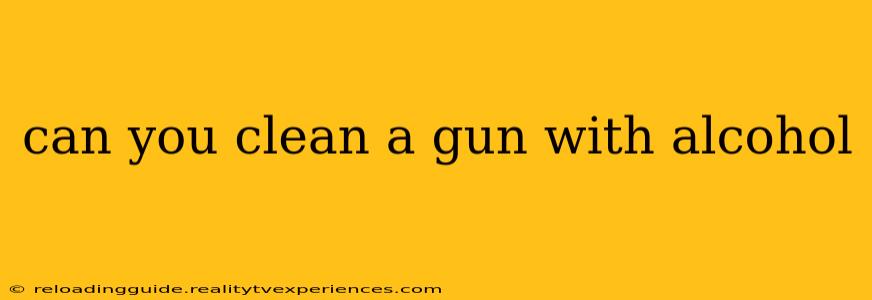Can You Clean a Gun with Alcohol? A Comprehensive Guide to Firearm Cleaning
The short answer is: it depends. While isopropyl alcohol (IPA) can be part of a gun cleaning process, it's not a complete solution and using it improperly can damage your firearm. This guide will explore the nuances of using alcohol in gun cleaning, highlighting its benefits, limitations, and potential risks.
Understanding the Role of Solvents in Gun Cleaning
Cleaning a firearm is crucial for maintaining its functionality, accuracy, and longevity. The process involves removing residue—powder fouling, lead, carbon, and other contaminants—that can build up after firing. Solvents play a key role in dissolving and breaking down this residue, making it easier to wipe away.
Historically, gun cleaning solvents were primarily petroleum-based. However, modern gun cleaning solutions offer a wider range of options, including alcohol-based products.
Isopropyl Alcohol (IPA) in Gun Cleaning: Benefits and Drawbacks
Isopropyl alcohol, typically available in concentrations of 70% or 90%, offers some advantages:
- Effective at dissolving some residues: IPA is a good solvent for certain types of fouling, particularly those less resistant to cleaning.
- Relatively inexpensive and readily available: It's easy to find in most pharmacies and stores.
- Faster drying time than some other solvents: This can speed up the overall cleaning process.
However, IPA also has significant limitations:
- Ineffective against stubborn fouling: It struggles to dissolve deeply embedded carbon, lead, and copper fouling. For these, dedicated gun cleaning solvents are necessary.
- Potential to damage certain finishes: IPA can damage some types of gun finishes, particularly wood stocks and certain polymer components. Always test a small, inconspicuous area first.
- Not a complete cleaning solution: It doesn't lubricate the firearm's moving parts.
How (and When) to Use Isopropyl Alcohol in Gun Cleaning
If you choose to use IPA, it's best used as a supplement, not a replacement, for a proper gun cleaning process. Here's how to incorporate it safely:
- Disassemble the firearm: Follow the manufacturer's instructions carefully. Improper disassembly can lead to damage.
- Use a dedicated gun cleaning solvent first: Address the heavier fouling with a solvent specifically designed for firearms.
- Apply IPA sparingly: Use a clean patch or swab dampened with IPA to wipe down areas that still have minor residue after the initial cleaning.
- Thoroughly dry all components: Allow parts to air dry completely before reassembly. Using compressed air can speed up the drying process.
- Lubricate moving parts: Apply a high-quality gun lubricant to all moving parts before reassembly.
Safer Alternatives and Best Practices
While IPA can play a minor role, consider these superior alternatives:
- Dedicated gun cleaning solvents: These are formulated to effectively dissolve various types of fouling and are generally safer for firearms.
- Specialized cleaning brushes and patches: These tools help reach all areas of the firearm effectively.
Always follow these best practices:
- Consult your firearm's owner's manual: This document will provide specific instructions on cleaning and maintenance.
- Wear appropriate safety gear: Eye protection and gloves are recommended.
- Clean in a well-ventilated area: Gun cleaning solvents and IPA can produce fumes.
- Store firearms safely: Proper storage is crucial for firearm safety and preventing accidental discharge.
By understanding the limitations of alcohol and following proper gun cleaning techniques, you can ensure the safe and effective maintenance of your firearm. Remember, responsible gun ownership includes diligent cleaning and maintenance. Never compromise on safety.

